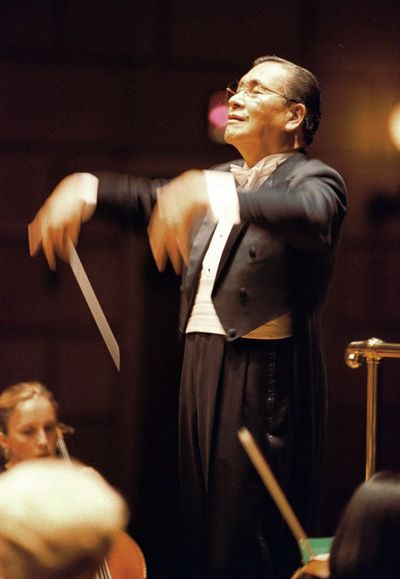Influential Sony chairman dies
Ohga, 81, credited with developing CDs

TOKYO – As a young man, aspiring opera singer Norio Ohga wrote to Sony to complain about the quality of its tape recorders. That move changed the course of his life, as the company promptly recruited the man whose love of music would shape the development of the compact disc and transform the Japanese electronics maker into a global software and entertainment empire.
Sony’s president, CEO or chairman from 1982 to 2003, Ohga died Saturday in Tokyo of multiple organ failure, the company said. He was 81.
Ohga’s connection to music steered his work. The flamboyant music connoisseur insisted the CD be designed at 4.8 inches in diameter to hold 75 minutes worth of music – in order to store Beethoven’s Ninth Symphony in its entirety.
From the start, Ohga recognized the potential of the CD’s superior sound quality. In the 1970s, when Ohga insisted CDs would eventually replace record albums, skeptics scoffed. Herbert von Karajan, Stevie Wonder and Herbie Hancock spoke up in defense of Sony’s digital sound.
Sony sold the world’s first CD in 1982 and CDs overtook LP record sales in Japan five years later. The specifications are still used today and fostered the devices developed since.
“It is no exaggeration to attribute Sony’s evolution beyond audio and video products into music, movies and game, and subsequent transformation into a global entertainment leader to Ohga-san’s foresight and vision,” Sony Corp. Chairman and CEO Howard Stringer said Saturday, using the Japanese honorific.
Some decisions made during Ohga’s presidency, such as the $3.4 billion purchase of Hollywood studio Columbia Pictures, were criticized as unwise and costly at the time. But Ohga’s focus on music, films and video games as a way to enrich the electronics business helped create Sony’s success in his era.
“We are always chasing after things that other companies won’t touch,” Ohga said in a 1998 interview with the Associated Press. “That is a big secret to our success.”
Shattering the stereotype of the staid Japanese executive, the debonair Ohga was never shy, his hair neatly slicked back, his boisterous manner exuding the fiery yet naive air of an artist. His persona added a touch of glamour to Sony’s image at a time when Japan had global ambitions.
Chairman of the Tokyo Philharmonic Orchestra since 1999, he continued to conduct there a few times a year. In 1993, he conducted the Metropolitan Opera Orchestra at Lincoln Center’s Avery Fisher Hall in a charity event funded by Sony.
Ohga often compared leading a company to conducting an orchestra.
“Just as a conductor must work to bring out the best in the members of his orchestra, a company president must draw on the talents of the people in his organization,” Ohga said in a 1996 Sony publication.